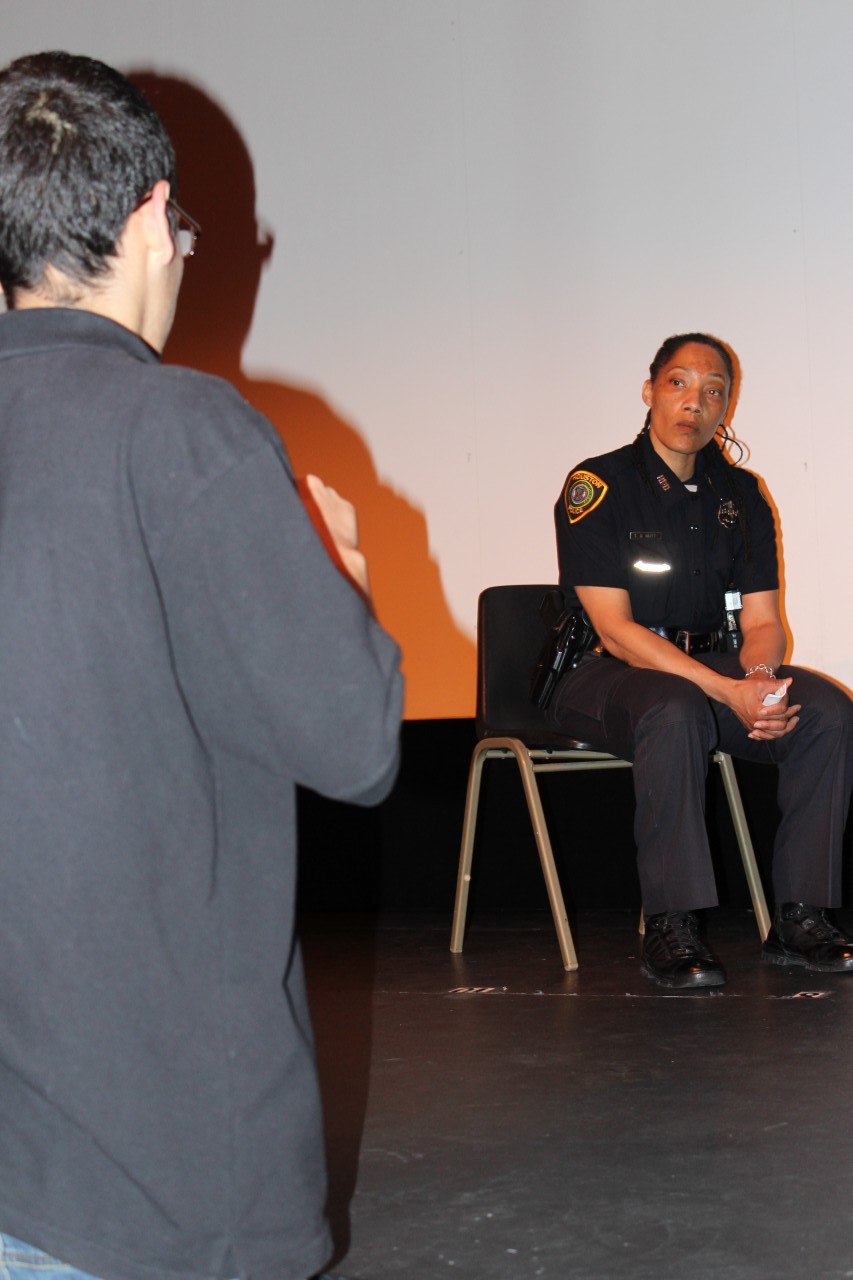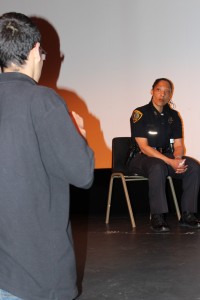
Teen and Police Service Academy presents Second Annual Youth and Police Conference

The University of Houston-Clear Lake collaborated with Teen and Police Service (TAPS) and Houston Police Department (HPD) to host the Second Annual Youth and Police Conference April 17.
Nearly 300 high school students from Houston, Galveston, La Marque, Spring, Clear Creek and Alief Independent School Districts attended the four hour event from 10 a.m. – 2 p.m in the Bayou Building.
The conference offered an opportunity for local area teenagers to express themselves in open discussion with participating police officers in mini interactive sessions covering key topics in police interaction, conflict resolution, dating and domestic violence, bullying, safe driving and career planning.
Many of the discussions began with officers introducing themselves, sharing stories and asking the students what they thought about police officers — both good and bad.
Treva Mott, HPD officer in public affairs, was a key speaker for the police interaction and conflict resolution session. Mott began the session by asking, “How many of you dislike police officers?” Almost 90 percent of attendees’ hands shot up in the air.
Mott said she appreciated the honesty but offered the following rebuttal. “Now, tell me this,” Mott said. “How many of you all actually had interaction with a police officer?”
Only a few hands were raised.
One of those hands belonged to Amber Scott, senior at La Marque High School. Scott witnessed what she perceived to be police brutality against a student in her school.
Scott recognizes that there are two sides to every story; by the end of the conference she had a different view toward law enforcement.
“There are certain police that you know are crooked, and they don’t do what they’re suppose to do, but you have to be able to know the difference…and realize that your actions display how the officer should act towards you,” Scott said.
Officer Mott encouraged the students to share what they have learned with family and friends.
“Officers have a lot of interaction with the community, and that’s what we’re trying to bring back and build a trusting relationship,” Mott said. “If you don’t like [police officers] — then you just don’t like us, but at the end of the day [police officers] take these uniforms off…we have children, we have sisters, brothers, nieces, nephews…so we’re just like you.”
Holly Roenig, counselor at Sam Houston Math, Science and Technology Center, said that at-risk students perceive law enforcement negatively because of personal and family experiences.
“I think [the Youth and Police Conference] is important because it helps our students to see that police officers can be viewed as humans,” Roenig said. “[Police officers] do not have to be depicted in a bad way or even a good way all the time. There’s good and bad people in the world, and it helps [youth] to view police officers as normal citizens that are maybe there to help them.”
Part of the negative opinion that students had toward police officers stemmed from what they perceived as a lack of respect. It was expressed by members of the audience that law enforcement abused their power and treated citizens poorly.
Monica Fortson, HPD officer and former Hightower High School teacher, reminds students that not all police officers are disrespectful and that as citizens they have the power to report the ones who are.
Fortson grew up in a neighborhood that was predominately white and witnessed her family being treated differently by police officers. It led her to dislike and avoid law enforcements while growing up.
Fortson had a change of heart and decided to become a police officer after constantly hearing about her students’ negative experiences.
“I left the classroom to be part of the change that I wanted for my kids,” Fortson said. “I’m telling you, do not let anyone take your power away from you. You have the power to let someone upset you, take you out of your own personality, take you out of your norm and take you out of the way you were raised.”
Not everyone who attended the conference came with a negative outlook toward law enforcement. Jasmine Pacheco, junior at Westside High School, found the conference beneficial for learning about career opportunities in law enforcement.
“I would like to be a cop; that is why I came here in the first place,” Pacheco said. “I would like go into investigation, so it is good for me.”
Pacheco explained that an added benefit of the conference was that students had the ability to get their opinions heard and police officers had the opportunity to gain better understanding from the feedback.
TAPS Academy is an 11-week program primarily designed for at-risk youth to partner and interact with mentor police officers to build trusting relationships and to learn from each other.
Everette Penn, UHCL associate professor in criminology, and Brian Lumpkin, retired HPD assistant chief, created the program in 2012.
TAPS’ goal is to reduce the social distance between law enforcement and at-risk teens through learning, interaction, discussion and problem solving. The program started in Houston but has since expanded to six locations around the world: El Paso, Texas; Galveston, Texas; Columbus, Ohio; Tampa, Fla.; Ponce, Puerto Rico; and St. Kitts, Nevis.
Brittany Cuba, UHCL psychology graduate student and TAPS intern explained that the conference is geared to receive community involvement. She has witnessed at-risk teenagers’ growth in interaction and perception of police officers through the TAPS movement and commends the program for doing a good job.
“I would not be a TAPS intern if I did not believe in what it does,” Cuba said. “It builds trusting relationships between at-risk teenagers and police officers.”
To learn more about TAPS, visit www.tapsacademy.org or visit The Signal’s special topics page on TAPS.

I liked the article! Very well done, Leena!
I find it’s important to the entire community that more time is spent understanding a person’s job is not their entire identity. I further contend that this basic understanding can affect and bring about needed change in the dynamic between perception of police and our community.